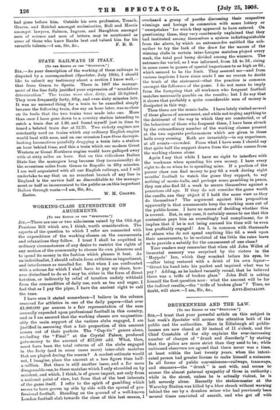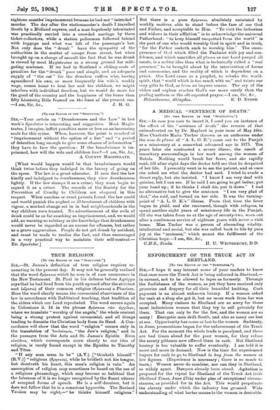DRUNKENNESS AND THE LAW.
rTo THE EDITOR OF TES " SPECTATOR:1
trust that your powerful article on this subject in last week's Spectator will arouse the attention both of the public and the authorities. Here in Edinburgh all public- houses are now closed at 10 instead of 11 o'clock, and the Chief Constable of the city explains the ever-increasing number of charges of "drunk and disorderly" by stating that the police are more strict than they used to be ; while unbiassed observers are agreed that there never was a time, at least within the last twenty years, when the intoxi- cated person had greater license to make himself a nuisance. In all forms of public conveniences—railways, tramways. and steamers—the " drunk " is met with, and seems to arouse the almost paternal sympathy of those in authority ; while in the street, unless he is actually violent, he is left severely alone. Recently the stationmaster at the Waverley Station was killed by a blow struck without warning behind the ear by a drunken miner who had previously been several times convicted of assault, and who got off with eighteen months' imprisonment because he had not " intended " murder. The day after the stationmaster's death I travelled South by a Midland express,'. and a man hopelessly intoxicated was practically carried into a crowded carriage by three ticket-collectors, while a station policeman followed behind with luggage and what was left, of the passenger's hat. Not only does the " drunk " have the sympathy of the authorities in the matter of escape from arrest, but when brought up on a charge of assault the fact that he was drunk i8 viewed by most Magistrates as a strong ground for miti- gating sentenee. If we had in Scotland a sliding-scale of penalties for the "drunk" pure and simple, and an adequate supply of "the cat" for the drunken ruffian who, having squandered his own, or more frequently his wife's, weekly wage, comes home to beat her and his children, we might interfere with individual freedom, but we would do more for the good of the country aud the happiness of the home than fifty Licensing Bills framed on the lines a the present one.







































 Previous page
Previous page